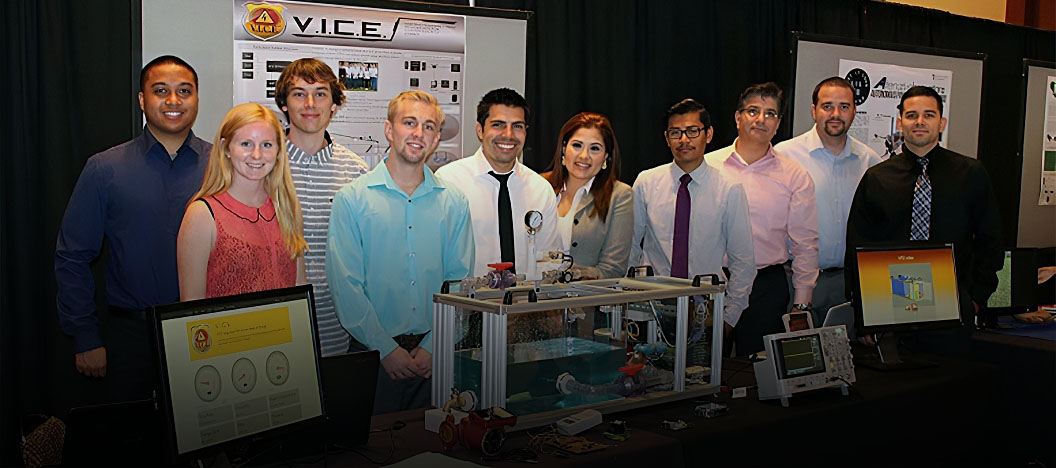Joint Doctoral Program
The Department of Electrical and Computer Engineering (ECE) faculty at SDSU are actively involved in research projects with graduate students. We offer a Joint Doctoral Program (JDP) in collaboration with the University of California, San Diego (UCSD). The program involves graduate level courses both at SDSU and UCSD, and research projects under the supervision of the Department of Electrical and Computer Engineering (ECE) advisor at SDSU, co-advised by the participating ECE faculty at UCSD. The Ph.D. degree is awarded jointly by the two cooperating institutions. Some faculty members are also involved in the Joint Doctoral Program of the Computational Science Research Center (CSRC). The graduates from this program recieve a Ph.D. in Computational Science. This program is joint with Clairmont Graduate University.
The research areas of interest to ECE faculty include Digital Signal and Image Processing, Multimedia, Computer Networks, Communication Systems, RF and Antennas, Computer Engineering, Digital System Design, VLSI Design, Electro-Optic System Design and Instrumentation, Control Systems, and Biomedical/ Rehabilitation Engineering.
Financial support is available to selected students. The applicants are encouraged to contact the ECE faculty members in their desired areas of specialization before applying.
More information regarding admission requirements and application procedure is available at the JDP website. and the CSRC website
Faculty Involved in the Program
Professor Amir Alimohammad: Brain-computer interfacing, computational neuroscience, VLSI signal processing, and reconfigurable computing. For more information please visit Professor Alimohammad's website.
Professor Ashkan Ashrafi: Digital and statistical signal processing, estimation theory, direct digital frequency synthesizers, multivariate signal processing, tensor and multi-way signal processing, biomedical and brain signal processing, audio and speech signal processing, applied mathematics and matrix theory. For more information please visit Professor Ashrafi's website.
Professor Sunil Kumar: Wireless networks: QoS-aware and cross-layer protocols for resource allocation/optimization, routing, MAC and scheduling, including the use of multi-beam directional antennas, for cognitive, ad-hoc, MANET, sensor, mesh, LTE, 5G and heterogeneous wireless networks; Multimedia (video, image and audio) processing: compression techniques (including HEVC and H.264 video standards), scalability and error-resiliency techniques for robust transmission of real-time multimedia streams on wireless and noisy channels; Digital image processing techniques, including image segmentation and registration, home energy efficiency. For more information please visit Professor Kumar's website.
Professor Chris Mi: Renewable and distributed energy systems; power electronics; electric and hybrid vehicles; plug-in HEV; electric power systems; speed-variable drives; permanent magnet machines; power systems; digital and analog electronics; finite element and analytical methods of electromagnetic fields; design, modeling, simulation and optimization of electrical machines; special electrical motors and generators for land, sea, air, and other industrial applications. For more information please visit Professor Mi's website.
Professor Yusuf Ozturk: Wireless Sensor networks, Internet of Things, Pervasive Computing, Protocol Modeling and Performance Estimation, Self Configuring Self Healing Networks, Residential networks, Brain Computer Interfaces, Wearable and Implantable physiological sensors and stimulators, Energy Management, Energy Demand Forecasting and Price Estimation, Cybersecurity. For more information please visit Professor Ozturk's website.
Professor Reza Sabzehgar: Smart grid, micro-grid, renewable energies, smart village, energy harvesting, power electronics, dynamic and modeling of distributed renewable energy and generation resources, control of distributed systems, control applications in sustainable energy systems, electric and hybrid-electric vehicles, plug-in vehicles, vehicle to the grid, regenerative suspension systems, regenerative road structure, and energy storage systems. For more information please visit Professor Sabzehgar's website.
Professor Mahasweta Sarkar: Wireless health, brain computer interface, channel modeling for implantable biosensors, wireless powering of biosensors and electric vehicles, cloud Computing, re-defining Socialization – the digital way, grapevine method of broadcast propagation using RF, seamless handovers in fast moving vehicles. For more information please visit Professor Sarkar's website.
Professor Satish Kumar Sharma: Tunable and reconfigurable antennas, MIMO antennas, electrically small antennas (ESAs), multiple modes based beam steering antennas, ink-jet printed antennas, 3D printed antennas, multiple beam antennas, beam peak and null steering antennas, feed systems for reflector antennas, substrate integrated waveguide (SIW) antennas, dielectric resonator antennas (DRA), frequency selective surface (FSS) antennas, millimeter and THz antennas, metasurfaces, metamaterials, filters, matching networks, and beam forming networks. For more information please visit Professor Sharma's website.

